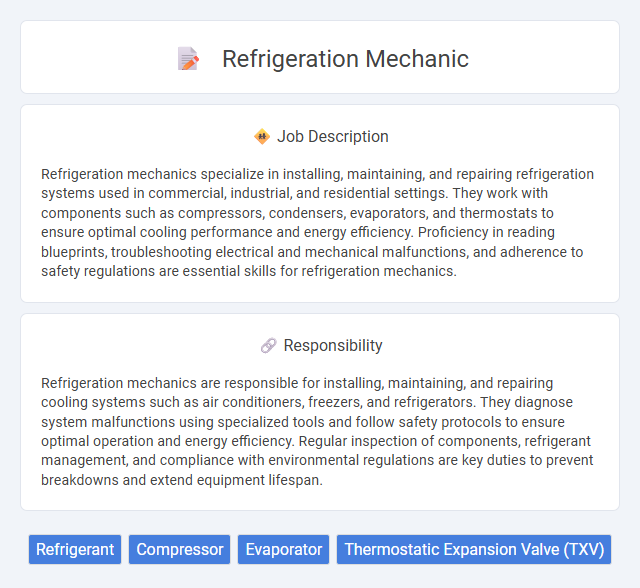
Refrigeration mechanics specialize in installing, maintaining, and repairing refrigeration systems used in commercial, industrial, and residential settings. They work with components such as compressors, condensers, evaporators, and thermostats to ensure optimal cooling performance and energy efficiency. Proficiency in reading blueprints, troubleshooting electrical and mechanical malfunctions, and adherence to safety regulations are essential skills for refrigeration mechanics.
Individuals with good physical stamina and strong problem-solving skills are likely to be well-suited for a refrigeration mechanic role, as the job often requires lifting heavy equipment and troubleshooting complex systems. Candidates who are comfortable working in varied environments, including confined spaces and outdoors, generally have a higher probability of success in this field. Those with a preference for routine desk work or a lower tolerance for physical labor might find this career less compatible with their strengths.
Qualification
Refrigeration mechanics require a high school diploma or equivalent, complemented by specialized training through vocational programs or apprenticeships. Certification such as EPA Section 608 is essential to handle refrigerants legally and safely. Strong technical skills, knowledge of HVAC systems, and proficiency in troubleshooting, installing, and maintaining refrigeration equipment are crucial for success in this profession.
Responsibility
Refrigeration mechanics are responsible for installing, maintaining, and repairing cooling systems such as air conditioners, freezers, and refrigerators. They diagnose system malfunctions using specialized tools and follow safety protocols to ensure optimal operation and energy efficiency. Regular inspection of components, refrigerant management, and compliance with environmental regulations are key duties to prevent breakdowns and extend equipment lifespan.
Benefit
Refrigeration mechanic jobs likely offer competitive salaries and steady employment due to consistent demand in commercial and industrial sectors. Benefits often include health insurance, retirement plans, and opportunities for overtime pay. Job security and career advancement chances may increase with specialized certifications and experience.
Challenge
Working as a refrigeration mechanic likely involves complex troubleshooting and maintaining intricate cooling systems that require precision and technical expertise. The job probably demands adapting to evolving technologies and solving unexpected mechanical failures under time constraints. This challenging environment may enhance problem-solving skills and offer continuous learning opportunities in HVAC and refrigeration fields.
Career Advancement
Refrigeration mechanics can advance their careers by obtaining specialized certifications such as EPA Section 608 and HVAC Excellence credentials, which enhance their technical expertise and job marketability. Gaining experience in commercial and industrial refrigeration systems can open opportunities for supervisory roles or project management positions. Pursuing further education in HVAC technology or engineering can lead to higher-paying jobs in design, installation, or system consulting within the refrigeration field.
Key Terms
Refrigerant
Refrigeration mechanics specialize in installing, maintaining, and repairing refrigeration systems that rely on various refrigerants like R-410A, R-134a, and R-22 to transfer heat efficiently. Proper handling and management of refrigerants are critical to ensure system performance, environmental safety, and compliance with regulations such as the EPA's Clean Air Act. Expertise in leak detection, refrigerant recovery, and system charging is essential for optimizing cooling efficiency and minimizing harmful emissions.
Compressor
Refrigeration mechanics specialize in installing, maintaining, and repairing compressors, which are critical components in refrigeration and air conditioning systems. These compressors function by compressing refrigerant gases, enabling the cooling cycle to efficiently transfer heat and maintain desired temperatures. Proficiency in diagnosing compressor malfunctions, performing refrigerant recharges, and ensuring proper system pressure is essential for optimal refrigeration system performance.
Evaporator
Refrigeration mechanics specialize in installing, maintaining, and repairing evaporators, which are critical components in cooling systems responsible for absorbing heat and facilitating the refrigeration cycle. Efficient evaporator function directly impacts system performance, energy consumption, and temperature regulation in commercial and industrial refrigeration units. Mastery of refrigerant handling, coil inspection, and airflow optimization ensures reliable evaporator operation and extends equipment lifespan.
Thermostatic Expansion Valve (TXV)
A refrigeration mechanic specializes in installing, maintaining, and repairing cooling systems, focusing on critical components like the Thermostatic Expansion Valve (TXV). The TXV precisely regulates refrigerant flow into the evaporator valve, improving system efficiency and preventing compressor damage by maintaining optimal superheat levels. Proficiency in TXV diagnostics and adjustments is essential for maximizing HVAC performance and energy savings.
 kuljobs.com
kuljobs.com